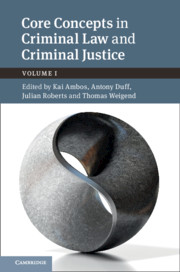Book contents
- Core Concepts in Criminal Law and Criminal Justice
- Core Concepts in Criminal Law and Criminal Justice
- Copyright page
- Contents
- Preface
- Abbreviations
- Contributors
- Part I Introduction
- Part II Criminal Law
- Part III Criminal Justice and Procedure
- 7 Proportionality of Punishment in Common Law Jurisdictions and in Germany
- 8 Criminal History Enhancements at Sentencing
- 9 Due Process
- 10 The Role of the Prosecutor
- 11 Negotiated Case Dispositions in Germany, England and the United States
- 12 Exclusion or Non-Use of Illegally Gathered Evidence in the Criminal Process: Focus on Common Law and German Approaches
- Index
- References
11 - Negotiated Case Dispositions in Germany, England and the United States
from Part III - Criminal Justice and Procedure
Published online by Cambridge University Press: 19 December 2019
- Core Concepts in Criminal Law and Criminal Justice
- Core Concepts in Criminal Law and Criminal Justice
- Copyright page
- Contents
- Preface
- Abbreviations
- Contributors
- Part I Introduction
- Part II Criminal Law
- Part III Criminal Justice and Procedure
- 7 Proportionality of Punishment in Common Law Jurisdictions and in Germany
- 8 Criminal History Enhancements at Sentencing
- 9 Due Process
- 10 The Role of the Prosecutor
- 11 Negotiated Case Dispositions in Germany, England and the United States
- 12 Exclusion or Non-Use of Illegally Gathered Evidence in the Criminal Process: Focus on Common Law and German Approaches
- Index
- References
Summary
In the United States, the Supreme Court recently acknowledged that ‘criminal justice today is for the most part a system of pleas, not a system of trials’. More than 95 per cent of convictions in the federal and state systems are the product of negotiated guilty pleas. In England and Wales, that number is about 90 per cent.
- Type
- Chapter
- Information
- Core Concepts in Criminal Law and Criminal Justice , pp. 389 - 427Publisher: Cambridge University PressPrint publication year: 2020
References
- 1
- Cited by



